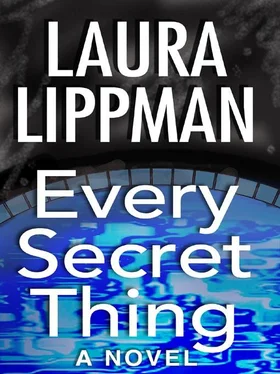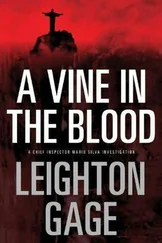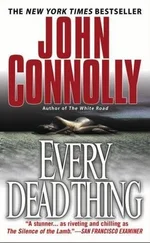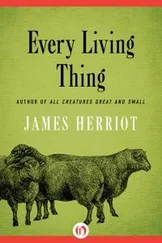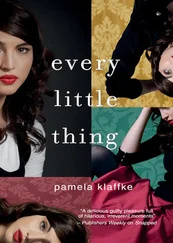“You should go to her,” repeated Warren, standing there in bare feet, his golf shoes in his hand so they wouldn’t damage the stone floor. She still remembered their consternation when the contractor explained, after the fact, that stone could be damaged.
“I have nothing to say to her.” But Maveen Little had finally disappeared, and the face on the television was a child’s, beaming over an Esskay hot dog.
“You have something to share. Something in common.”
It was all she could do not to snap back: I will never have anything in common with Maveen Little.
“I’m worried she’s not going to engender a lot of sympathy,” Cynthia said, picking her words carefully.
“Because she’s unattractive and inarticulate?” Warren was being characteristically generous. Maveen Little was ugly, pale and overweight, with bad skin and a home permanent. “Oh, honey, people aren’t that bad.”
“They’re worse, and you know it.”
Warren had no answer for that, so he kissed her on the temple, more of a father’s kiss than a husband’s, and eeled out the door, his last look for the television, which he clearly yearned to turn off. When had their kisses migrated from mouth to cheek to temple? Before Rosalind’s birth or after? Cynthia couldn’t remember. She supposed a day would come when Warren would kiss the top of her head, or settle for a fond shoulder pat, and she still wouldn’t care. She loved him, possibly more than ever, but she just couldn’t work up the abandon of man-woman love, not while trying to maintain the vigilance required by mother-child love.
This mother’s grief was genuine, at least, the kind of grief that distorted face and voice. Not that anyone could really tell. People liked to say, after the fact, that they suspected the South Carolina woman was lying, that they were not surprised when her little boys turned up at the bottom of a lake. But Cynthia knew that people’s powers of observation were anything but acute.
“Dear Black Bitch,” a concerned citizen had written her seven years ago, divining her address from the numbers on the house, visible in some of the television newscasts, and the newspaper accounts of the crime, which helpfully identified the street. “Who do you think you are kidding? Everyone knows you killed your baby and are trying to get the Black People to Riot again by saying White Children did this. I will be on my roof with my rifle. Just Like 1968. You have already destroyed the city and now the county is full of Negroes, too. When will you be satisfied?”
The detached part of her mind, the part that had split away soon after Olivia was taken, marveled at the letter’s punctuation and capitalization. Just Like 1968. It was as if the writer thought these words constituted a sentence, or at least a complete thought. Perhaps they did. “Just Like 1968” referred to the riots after King was shot, when white people ran for the city-county line, and the old men of Little Italy really did take their guns to the rooftops, ready to fire if they saw black people crossing Pratt Street.
Maveen Little would get letters, too. The cruelty would be different, more about ignorance than race, although her obvious preference for black men, as evidenced by her café-au-lait child and dark-skinned boyfriend, would draw a few choice comments. No, there would be no shortage of people happy to tell Maveen Little that she was a terrible mother, one who had earned her fate. If the crime proved to be connected to Olivia’s death, Cynthia would come up for dissection again, would be drawn into the circle of blame for the sheer sin of continuing to exist. In the end, no one who had been spared by fate could afford to believe it was random.
Was Brittany Little’s disappearance connected to Olivia’s death? For the first time in years, Cynthia Barnes had read the Sunday paper cover to cover, but she had not expected to find anything she had not known twenty-four hours earlier. Although a civilian for almost seven years now, she had not forgotten the rhythms of the local news operations, the fits and starts with which stories moved forward over a weekend. Only a high-ranking official-the commissioner himself-could confirm that the new case might be linked to an old one, and he wouldn’t do that unless someone knew enough to ask. Even then he might not be allowed to tell, because the girls had been juveniles the first time. She knew enough about the law to know that a jury would never be allowed to consider the earlier murder, not unless the girls themselves took the stand.
But eventually, someone would put two and two together, and then the calls would start. Reporters would finally track Cynthia down, and this time she would be happy to tell them exactly how she felt. Angry, betrayed, saddened. She would play up the sad part, although it was the least of her feelings. She would find a subtle way to remind newspaper readers and television watchers that she was the one who had wanted to find a way to put these girls away for life, not a mere seven years. The public defender, the juvenile master, the girls’ parents-they had acted as if they were doing Cynthia a favor, fashioning the seven-year sentence from a trio of charges. Instead, they had left the entire city vulnerable.
Assuming the cases were connected. She tried to keep her mind open to the possibility that she was wrong, but Cynthia could not see how the resemblance between her daughter and the missing child was a simple coincidence. The hair, the skin tone, the age-it was too creepily similar. She would not have mistaken Brittany Little for her Rosalind, but a nonmother, a person who had glimpsed Rosalind only from afar, could make that error. A person who had studied her, say, from across the street, or in the Giant on Edmondson Avenue. No, it could not be a coincidence.
But then, Cynthia could not accept the idea that Olivia’s death was coincidental, which everyone else, even Warren, had been so ready to believe. Cynthia had seen a rebuke, a conspiracy. “Why do they hate us so?” she had asked her father, all but crawling into his lap as if she were a child again.
The judge had patted her awkwardly, helpless as everyone else. She had never seen her father without the right answer before. But he was dumbfounded, incapable of explaining how two seemingly normal children could do what they had done. A lifetime of being a judge could not prepare a man for this. Anyone who spent time in the Clarence Mitchell Courthouse knew the city’s killers were in the end utterly fathomable . For one thing, they looked like what they were-hard, soulless, dead inside. And they had come honestly by their status, via childhoods so damaging that one wondered more at those who didn’t kill than those who did. They even had motives, however twisted. Judge Poole liked to say that what the drug dealers of Baltimore did wasn’t that different from what the corporations of America did up the road in Delaware, where the federal courts heard cases on takeovers and poison pills. “It’s just a little more direct,” he said of the city’s lethal transactions. “A little more final. But it’s still business.”
Yet even Judge Poole could not see the death of Olivia as anything other than the worst imaginable luck. Cynthia wondered if some well-meaning friend was holding Maveen Little’s hand and trying to comfort her in that inept fashion she could neither forget nor forgive. You couldn’t have done anything… You didn’t do anything… Don’t second-guess yourself… You must not blame yourself. In the days after Olivia’s body was found, nothing had made Cynthia feel worse than the people who had tried to make her feel better.
Should she go see the missing girl’s mother? She wanted to feel something for the woman, but she didn’t, and she wasn’t sure she could fake it very well. Maveen Little made Cynthia feel shamed, as if there were an unwritten protocol for mothers deranged by grief. This woman was so, well, sloppy in her appeals to whatever phantoms held her child. Cynthia had maintained a dignity that some found cold-the “Dear Bitch” letters implied as much-but that was her upbringing. Her parents would not have wanted Cynthia to sob and fling her body about like some ignorant churchwoman. A hard, cynical person-someone like Cynthia’s sister, Sylvia, or even the old Cynthia-might have thought, I’d have snatched Brittany Little, too, to save her from that mama.
Читать дальше
